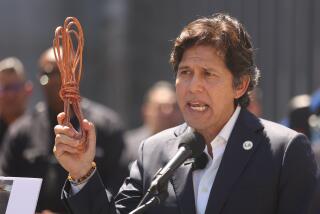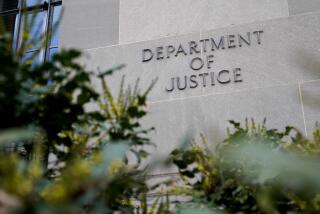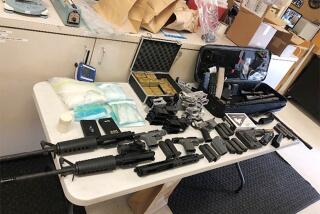Nearly 1,000 Telemarketers Arrested in 2 1/2-Year Probe
WASHINGTON — A 2 1/2-year federal and state investigation in which undercover agents taped telephone solicitations has produced criminal charges against nearly 1,000 telemarketers, Atty. Gen. Janet Reno told a news conference Thursday.
More than 40 telemarketers were arrested Thursday, including 17 in Los Angeles and Orange counties, Reno said.
In Operation Double Barrel, FBI agents, retired agents and senior citizens recruited by the American Assn. of Retired Persons posed as previous victims, who frequently are contacted again by telemarketers in “reload” scams. They recorded the calls for evidence.
“Now each time a telemarketer picks up the phone, they are taking a risk. When telemarketers call, we have often answered,” Reno said.
Since Double Barrel began in July 1996, 795 people have been charged with federal crimes, including wire and mail fraud, money laundering and racketeering, and 194 others have been charged with state crimes in 14 states. An additional 394 people have been sued in civil actions.
Federal convictions have resulted in some prison sentences as long as 20 years.
The investigation was joined by 20 U.S. attorney’s offices, 21 FBI field offices, 35 state attorneys general, the Postal Inspection Service, the Federal Trade Commission, the Securities and Exchange Commission and the Commodity Futures Trading Commission. California’s attorney general was not among the 35.
The operation grew out of an earlier, smaller effort, Operation Senior Sentinel, which ended in 1995. Senior Sentinel was the first undercover effort directed at telemarketing fraud. It investigated 180 telemarketing “boiler rooms” concentrated in Buffalo, N.Y., Chattanooga, Tenn., and Las Vegas; 598 people were convicted.
Reno described one scam in which a telemarketer called a previous victim pretending to be an FBI agent trying to catch the earlier telemarketer. The counterfeit agent mailed a phony court order to the victim purporting to authorize a wiretap of the victim’s telephone.
Next, the crook called back using a different voice and promised to recover the victim’s loss for a 10% fee, Reno said. In a third call, the crook again posed as an FBI agent and urged the victim to send the money so the telemarketer could be caught red-handed.
“Anyone who calls you, tells you they’re from the FBI, and asks you to pay a fee so they can get your money back is lying,” Reno said. “No federal or state law enforcement agency will ever charge fraud victims a dime when they try to get money back for victims.”
More to Read
Sign up for Essential California
The most important California stories and recommendations in your inbox every morning.
You may occasionally receive promotional content from the Los Angeles Times.










